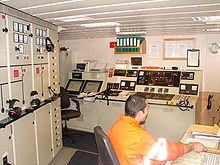This is an old revision of this page, as edited by Joffeloff (talk | contribs) at 15:31, 22 October 2010 (Guys. I know you love your randomized capitalizations. But this is supposed to be an encyclopedia, which means we *don't do that shit*. It looks unprofessional and retarded, FYI). The present address (URL) is a permanent link to this revision, which may differ significantly from the current revision.
Revision as of 15:31, 22 October 2010 by Joffeloff (talk | contribs) (Guys. I know you love your randomized capitalizations. But this is supposed to be an encyclopedia, which means we *don't do that shit*. It looks unprofessional and retarded, FYI)(diff) ← Previous revision | Latest revision (diff) | Newer revision → (diff)
Marine engineering involves the design, construction, installation, operation and support of the systems and equipment which propel and control marine vehicles, and of the systems which make a vehicle or structure habitable for crew, passengers and cargo.
Marine engineering is allied to mechanical engineering, although the old marine engineer requires knowledge (and hands-on experience) with electrical, electronic, pneumatic, hydraulic, chemistry, control engineering, naval architecture or ship design, process engineering, steam generation, gas turbines and even nuclear technology on certain military vessels.
Marine engineering on board a ship refers to the operation and maintenance of the propulsion and other systems such as:electrical power generation plant; lighting; fuel oil; lubrication; water distillation; air conditioning; refrigeration; and water systems on board the vessel. This work is carried out by Marine Engineering Officers, who usually train via cadet ships sponsored by a variety of maritime organizations. There are also training centers at post-secondary institutions that offer marine engineering programs, such as Autonomous Underwater Vehicle research; marine renewable energy research; and careers related to the offshore oil and gas extraction and cable laying industries.
History of marineengineering
One of the most notable figures in marine engineering in antiquity was Archimedes, who experimented with buoyancy, developed the water screw, and pre-industrial naval weapon systems. Pioneers in marine engineering in Britain include William Froude and Isambard Kingdom Brunel, who illustrated the effectiveness of the screw propeller, amongst other notable achievements. The oldest surviving marine engine was designed by William Symington in 1788. The ship 'Turbinia' first demonstrated the superiority of the steam-turbine engine, which is still used for marine propulsion today in some niche applications. In America, the University of Michigan's Department of Naval Architecture and Marine Engineering can be tracked to an 1879 act of Congress, which authorized the U.S. Navy to assign a few officers to engineering training establishments around the country. Mortimer E. Cooley was the first lecturer in the department.
Marine engines
Marine engineering emerged as a discipline with the arrival of marine engines for propulsion, largely during the latter half of the 19th century. Early marine engineers were known as "stokers" as they 'stoked' the coal fires of steam engined ships more or less from the middle of the 19th to the middle of the 20th centuries; the term is still used affectionately by modern ship's engineering staff to describe their role.
See also
- AUV
- Engine room
- List of maritime colleges
- Marine fuel management
- Seafarer's professions and ranks
- Society of Naval Architects and Marine Engineers
- Ship
- List of Russian naval engineers
References
| This article includes a list of references, related reading, or external links, but its sources remain unclear because it lacks inline citations. Please help improve this article by introducing more precise citations. (November 2008) (Learn how and when to remove this message) |
External links
| This article's use of external links may not follow Misplaced Pages's policies or guidelines. Please improve this article by removing excessive or inappropriate external links, and converting useful links where appropriate into footnote references. (September 2009) (Learn how and when to remove this message) |
Maritime resources
- International Maritime Organization (IMO)
- Marine Engineering Study Materials
- The Institute of Marine Engineering, Science and Technology
- Society of Naval Architects and Marine Engineers
- Society for Underwater Technology
- Marine Engineering Knowledge
- University of Michigan's Department of Naval Architecture and
Marine engineering studies
Marine navigation and deck side studies
Marine engineering
- The Science Museum
- Royal Navy School of Marine Engineering
- Scania's first engine 1897
- Additional unreferenced data
- Inventor of the screw propeller
- Archimedes